Semrush vs. Similarweb, which of these is the better tool? That’s what I’m answering today. For every single verdict, you’ll get solid, verifiable reasons based on my personal experiences with each.
Table of Contents
- Semrush vs. Similarweb: Which is better?
- Semrush vs. Similarweb: Which to choose for SEO?
- Which of the two offers better onboarding?
- Which to choose for competition research?
- Which to use for Keyword ideas?
- Which to use for Keyword research?
- Which is better for paid-ad research? (Text Ads and PLAs)
- Semrush vs. Similarweb: Which offers better Display Ad data?
- Semrush vs. Similarweb Pricing Plans
- Which are the reasons to choose Semrush over Similarweb?
- Semrush vs. Similarweb which is better for local SEO?
- Reasons to choose Similarweb over Semrush
- Semrush vs. Similarweb final verdict- Which is better?
- Frequently Asked Questions
- #1. Semrush vs. Similarweb: Which offers more features?
- #2. Which of these two offers a free trial?
- #3. Do I need credit card to avail Semrush or Similarweb free trial?
- #4. Can I upgrade my plans with both the tools?
- #5. Which of these offers better data accuracy?
- #6. Semrush vs. Similarweb which offers more value for money?
- Frequently Asked Questions
Semrush vs. Similarweb: Which is better?
I do not believe in passing absolute judgments. Rather, I’ll answer the following questions in-depth throughout this piece and let you choose the winner.
Semrush vs. Similarweb: Which to choose for SEO?
If “SEO” is your primary objective, Semrush is the clear winner. I’ll give you reasons.
Similarweb has a much smaller backlink database (nearlyx smaller) than Semrush. No on page SEO features. No rank tracking features. That’s literally most of “SEO”, and Similarweb doesn’t have features for them.
On the other hand, Semrush has a database of nearly 46 TRILLION (44.5 T to be exact) backlinks! It also allows you to track your rankings for both mobile and desktop devices. A very detailed on-page SEO audit with improvement suggestions too can be generated using Semrush.
I do still love Similarweb but it’s for non-SEO reasons (which I’ll explain in detail in the later sections).
Winner: Semrush, based on availability of SEO-specific features.
Start Semrush 14-days Free Trial Now
Which of the two offers better onboarding?
I’m starting here because it’s the first step you’ll have to go through, right?
With Semrush, you select a package or get the 14-day Semrush free trial and you get access to your dashboard. Simple. (It’s free forever even after the trial ends!)
On SimilarWeb, you get to choose from 4 plans. The Starter and Professional plans have transparent pricing while the Team and Enterprise are custom solutions. It does offer a 7-day free trial (with credit card).
pricing plans
It also has a 7-step long form that you fill during signup. It asks for basic information such as role, team-size, website etc.
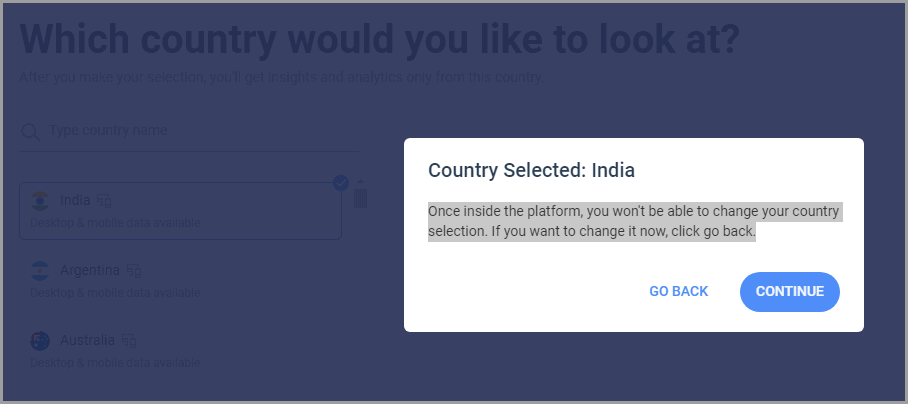
A major problem with its plans are the features. Some filters (e.g. geo-filters) are only available in the more expensive plans. Comparatively, Semrush gives me data for any website from all 190 country and regions and the ability to combine multiple countries/regions endlessly.
The bigger problem I faced during my first few days was its non-automated, manual upgrades! Some features are locked on Similarweb which is understandable. However, you can’t just click “upgrade”, pay, and start using those features!
You must “contact a specialist”.

These specialists aren’t online 24X7. So I had to wait more than just a few hours to upgrade a plan I was willing to pay for!
I’ll be honest here, if you’re reading this I value you as my reader. So, will I recommend you the vague, time-consuming Similarweb or the automated, instant Semrush? You decide.
Do note that Similarweb is still a power-packed tool, it’s just that the first few minutes on the platform aren’t as smooth as Semrush.
Winner: Semrush, based on ease of understanding, automated, instant upgrades, transparent features.
Try Semrush for Free Right Now
Which to choose for competition research?
The one feature both Semrush and Similarweb have directly in common is their “Competition research” feature.
Similarweb lets me compare a total of 5 domains. In fact, it auto-suggests my top competitors and I only have to choose the ones I’d like to compare.
Once they’re added, Similarweb shows me traffic share, visits, change, time on site, and bounce rate for all my competitors. Pretty impressive, isn’t it?
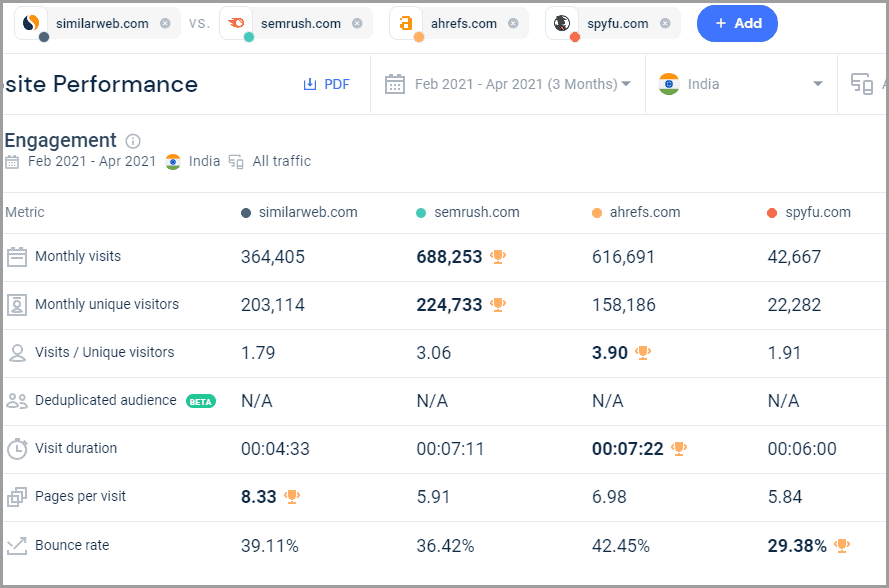
Country rank/ global rank for each domain, device-based data (mobile vs. desktop hits), top countries, and even paid ad campaigns are included.
Do note that Similarweb offers data from less than 100 geographic regions. Also, locations cost extra. Semrush offers data from 190 countries with all plans without any additional payment. (Comparison is what you’re here for, right?)
Both the tools also show “keyword opportunities”. This is basically a list of keywords which your competitors are getting traffic from, but you aren’t! (Compared in detail in the next section).
However, Semrush allows comparing up to 200 domains at once via its bulk analysis report! Compared to Similarweb’s 5 domains, that’s a massive win, isn’t it?
To get what Similarweb is offering above, I use the “Traffic Analytics” feature under Semrush’s “Competitive Research” module. Here are the results:

Even if you’re a complete newbie, Semrush has these “video tutorial” (at the top) on how to use every single tool to its full potential! Similarweb doesn’t offer the same.
If we talk data similarity, both tools show me the traffic, bounce rate, average visit duration for all the domains. Both the tools also tell me the “type” (organic/ paid/ social/ branded) of traffic for all the domains.
Additionally, Semrush also has a “Backlink Gap” feature. It shows the backlinks I don’t have but my competitors do. This is a feature that’s completely missing from Similarweb.

Moreover, Semrush also offers a “traffic journey” flowchart. It shows the source of traffic, and the next destination of your users after visiting each domain. This really helps uncover top traffic sources and partners your competitors may be using.
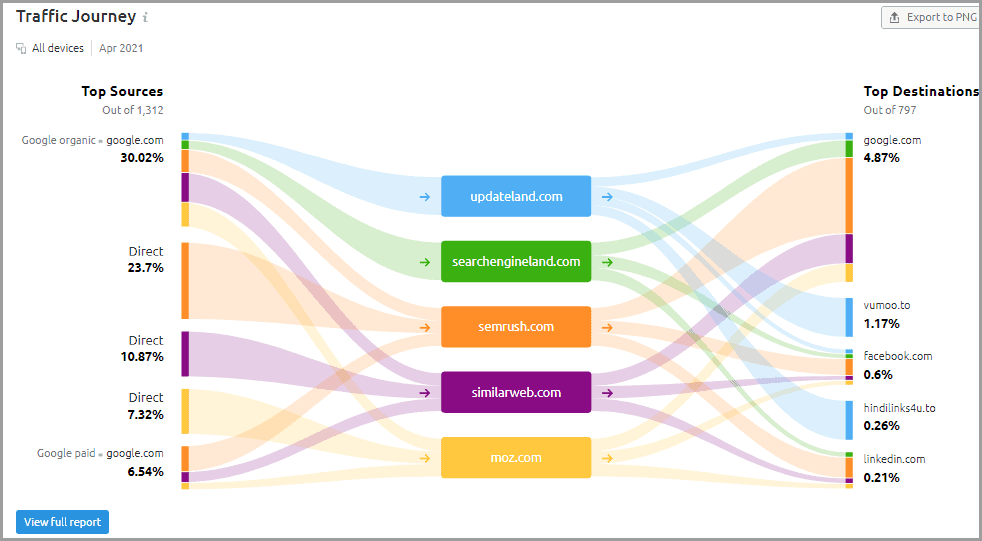
The traffic flow feature and data are not available on Similarweb.
Spyfu is a major competitor-research tool, but even when I compared Spyfu to Semrush, Semrush won by a pretty large margin! The same holds true for its battle against Similarweb as well.
Other mentionable features:
- Semrush offers historical data from as far back as 2012 for some tools, for free. Similarweb only has records up to 3 years, and it costs extra. Their most basic plan only includes 37 months of data.
- Semrush offers 1000-page traffic data for all results, Similarweb offers way less although you can pay extra for more results.
Winner: Semrush because it offers additional data (traffic journey), features (backlink gap) and data from more countries at no extra cost.
Semrush vs. Similarweb Keyword Gap comparison
This is a “competition research” feature as well and it’s common to both the tools.
Remember the “keyword opportunities” we talked about earlier? Well, Semrush has a dedicated tool for that called the “Keyword Gap”. It lets me enter 5 domains and shows me which keywords overlap, or are missing from each of these domains as compared to others.
So, Similarweb allows adding 5 domains to compare against each other, the number is the same for Semrush as well.
Similarweb offers pretty decent filters. You can:
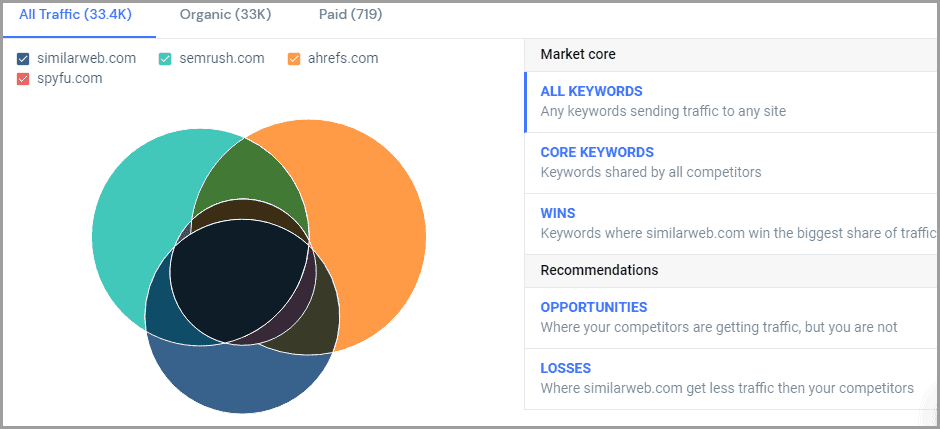
- Select keywords shared by all domains
- Select keywords exclusive to you
- Find best keywords for you
- Find keywords you missed
- Check data for paid keywords
- Find keywords which you own but rank lower than your competitors.
In-depth data for each keyword including traffic, position for each site, volume, CPC, SERP features etc. too is made available. So yes, it’s pretty useful and impressive.
Semrush too offers all of this, and then a few more insights. You can filter:
- Common keywords
- Missing keywords
- Available but not ranking keywords
- Rankings for each keyword, for every compared domain.
- Keywords exclusive to you
- Paid keyword data
- CPC/difficulty/ paid keyword difficulty*/number of results/intent for each keyword.

*The star-marked data is exclusive to Semrush and not available with Similarweb.
Similarweb has a “Keyword Seasonality” feature which shows the “peak” months and days when a keyword generally trends or is in demand. Semrush too has a “Market Explorer” which displays the same data. It automatically compares the top domains for the keyword.
Semrush also includes growth quadrants, market dynamics, and “traffic generation strategy”. All of this is absent on Similarweb except the traffic source which Similarweb displays as well.

Also, I repeatedly faced a major issue with Similarweb. It throws “data not available” error for most domains you enter for comparison.
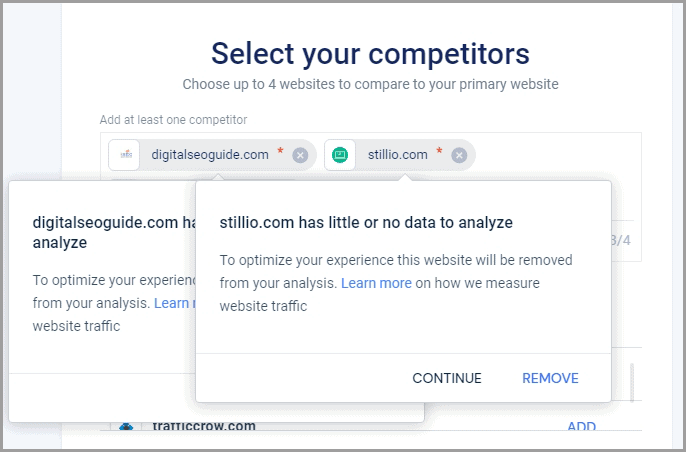
I later found the fact that Similarweb only indexes data from websites which have at least 5K monthly hits! This was a major downer for me as there’s no such limit on Semrush.
Winner: Semrush, because it allows 200 bulk comparisons against Similarweb’s 5 domains, it shows paid difficulty, offers a free traffic journey chart and include everything that Similarweb’s competition research does. Also, Similarweb’s “data not found” error is unfortunately pretty frequent.
Get 14 days Semrush free trial Now
Which to use for Keyword ideas?
Most digital marketing campaigns, be it for SEO, ads or even simple hashtags would involve keywords, right? Also, both of these are primary features with these tools and hence make for easy comparison.
Similarweb offers a “Keyword Generator” for starters. It lets you enter a seed keyword, and generates thousands of ideas you can work with. Both Similarweb and Semrush offer keyword ideas for Google and Amazon (The Semrush Ecommerce Keyword Analytics tool on Semrush offers Amazon keywords). So if you’re into e-commerce, it’s pretty helpful.
Semrush too has a “Keyword Magic Tool” as well as a “Topic Research” tool. Both of which offer similar features. However, Semrush has a keyword database of 26 BILLION keywords! This is literally “the largest” in the industry!
When I enter “face masks” on Similarweb’s keyword overview, it gave me 45 other similar keywords. Semrush on the other hand came up with 464,160 keywords!

In my experience, for every single keyword, I get 100-500x more keyword ideas with Semrush than I get with Similarweb. And hey, it’s not “opinion” or “hearsay”, you can go verify it right away with the free trial!
Start Semrush 14-days Free Trial Now
Moving on, here are the filters available on both the sites:
- CPC
- Volume
- Difficulty*
- Word count*
- SERP features*
- Number of results in SERP*
- Competition Density (while both Semrush and Similarweb offer the feature, Semrush has unique metrics such as “personal keyword density, potential traffic, potential position, topical authority” etc.).
*These are exclusive to Semrush.

In fact, while Similarweb doesn’t have the “Keyword Difficulty” metric altogether, Semrush actually has “the most accurate” Keyword Difficulty in the industry!
Moreover, Similarweb doesn’t have the “Topic Research” feature that Semrush does. It suggests a lot more than just “keywords”. You can literally craft entire articles using the topics /subtopics that it suggests! (Read more in detail in the later sections).
I must say though, Similarweb’s “Keyword Seasonality” is pretty impressive. You can choose an industry, say “Internet”, and it shows top keywords which peak in certain months for those industries. Getting the same results is totally possible using Semrush using the right filters, however, it’s just easier on Similarweb.
Winner for “Keyword Generation”: Semrush. It has a much bigger keyword database, offers way (wayyyyy) more keyword filters, shows keyword difficulty and competition density, and also has the “Topic Research” feature that Similaweb misses.
Start Semrush 14-days Free Trial Now
Which to use for Keyword research?
We’ve established that Semrush offers better, more, and more accurate “new keyword ideas”. However, when you already have a keyword(s), which tool offers better data?
I’ll compare Similarweb’s “Analyze Keywords” feature with Semrush’s “Keyword Overview”.
Semrush allows analyzing up to 100 keywords at once! Almost an identical feature on Similarweb allows creating keyword lists as well.
Anyway, the tools display:
- Search volume
- CPC
- Top sites in the results
- Ads for the keyword
- SERP features
- Country-based volume
- Related/Question and Phrase keywords.
- Ad history*
- Paid competition*
- And Keyword difficulty*
- Personal Keyword Difficulty*
- Topical Authority*
- Potential Position*
- Potential Traffic*
*These are only available with Semrush.
Winner: Semrush, because it also shows additional metrics (marked above) which Similarweb doesn’t.
Start Semrush 14-days Free Trial Now
Which is better for paid-ad research? (Text Ads and PLAs)
Both the tools offer insights into paid ads! So, who wins this Semrush vs. Similarweb battle? Let’s see.
For any domain that I enter onto Semrush’s “Domain Overview” feature, it shows me the “Paid keywords” as well as the “Paid Position Distribution” for the keywords.

Similarweb too has a “Paid Competitors” page displaying the same data as Semrush.
Similarweb has a “Search Ads” page which shows the ads and ad-keywords for any domain. Semrush too has an identical feature, with identical metrics called “Advertising Research”.
Now, Semrush shows me the “Traffic” and even the “Traffic Cost” for all the keywords for the domain. These two metrics aren’t available on Similarweb.

Similarweb also has a “Product Ads” page which shows PLAs (Product Listing Ads). Semrush again has a “Product Listing Ad” feature dedicated just for PLA research.
Although, if you search “amazon.com” on Semrush’s PLA module, you’ll get hundreds if not thousands of PLAs. Similarweb for the same domain yields no results. I’ve verified this with multiple other domains. This proves that the PLA database on Similarweb is definitely smaller than that of Semrush.
Furthermore, Semrush has a “preview” option. You can click on the SERP button to check the ad as it appears on Google but Similarweb doesn’t offer this feature. Semrush also shows the “volume” for the ad-keyword, again this isn’t something Similarweb shows.

Winner: Both the tools offer almost similar data. Semrush shows “traffic” and “cost” for ads just like Similarweb.
Start Semrush 14-days Free Trial Now
Semrush vs. Similarweb: Which offers better Display Ad data?
Before I say anything, I’ll show you what you can expect with both the platforms.
Here are the results for “amazon.com” when searched using Semrush’s Display Advertising feature:
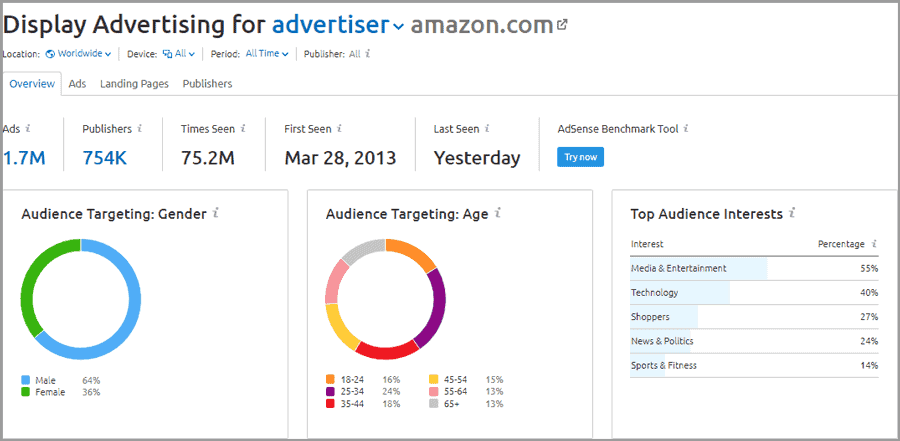
And here’s what Similarweb shows for the same domain:
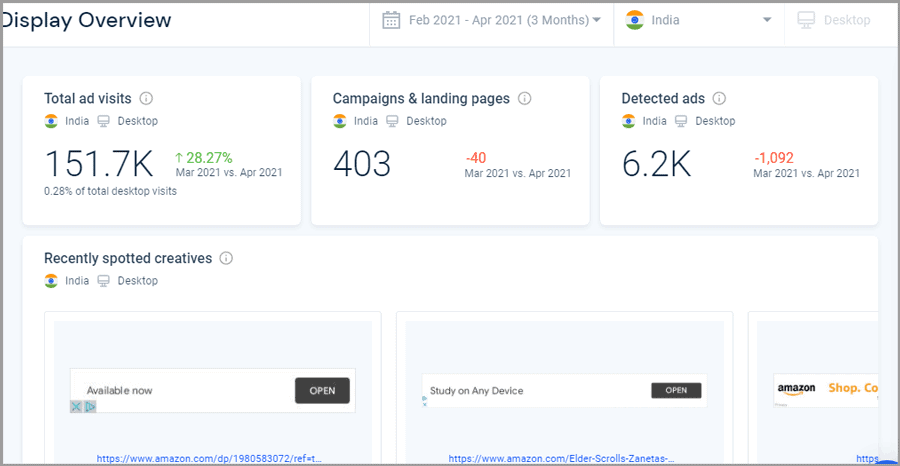
To keep things fair, please remember that Semrush is showing “All time” data while Similarweb is showing monthly data. Hence, please do not judge based on the difference between the “number of ads”.
Now, Similarweb shows “ total ad visits” and this is something Semrush doesn’t display. This data technically “can” be obtained on Semrush if I combine a few features, filters, maths and common sense on Semrush. However, for now, I’ll say Similarweb wins as far as this aspect goes.
Both the tools display a full list of ad publishers for the domain. However, only Similarweb also includes an “Ad network” list. Again, Similarweb has the edge.
Now, notice those three:
- Audience Targeting Gender
- And Audience Targeting Age
- And Top Audience Interests metrics on Semrush?
Those are only available on Semrush! They literally let you copy the entire targeting strategy being used by your competitors.
Additionally, Semrush shows Images/ HTML and Text ads being used by the domain I enter. On the other hand, Similarweb seems to be limited to image and video ads only.
Moreover, Semrush also shows device breakdown! You know which devices see most of these ads. This too is absent on Similarweb.
Finally, there’s this new (probably, at least I only noticed it recently) “Adsense Benchmark Tool” on Semrush. In simpler words, it tells me how much any website makes/month from Adsense.
Similarweb has a similar “Monetization potential” tool however, it’s a bit different than what Semrush is offering. It has this “Media Buying Research” module which Semrush doesn’t offer.
The module shows you the “outgoing ads” for any domain. In other words, you can check which domains are worth partnering up with for ads.
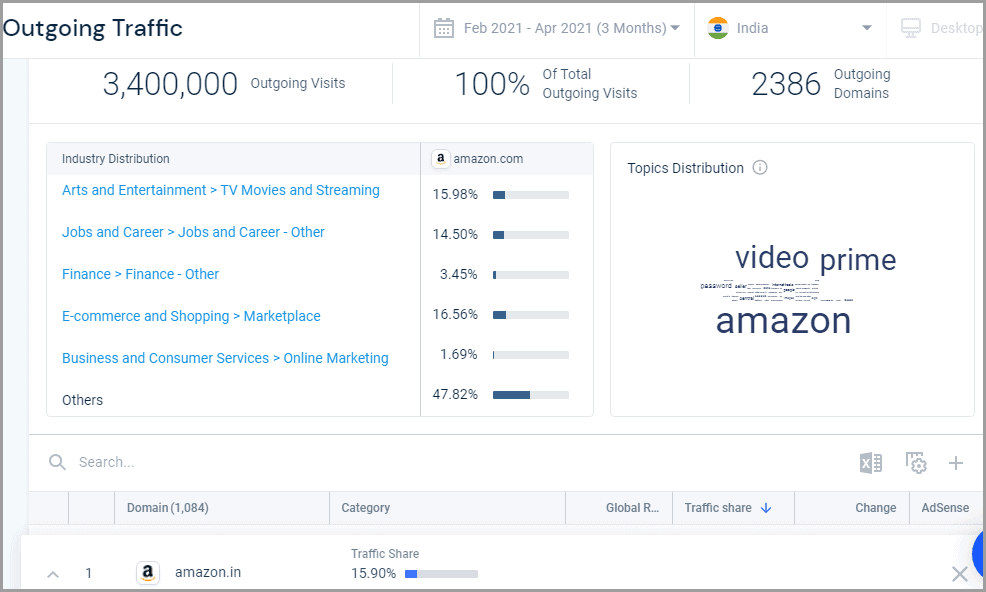
Winner: Semrush because it offers target audience insights and more ad-types. Similarweb will be the winner for you if you need to find potential partners for ads.
Start Semrush 14-days Free Trial Now
Semrush vs. Similarweb Pricing Plans
Before I wrap this piece up, let’s talk pricing?
Both the tools offer free trial plans. However, you get 14-days Semrush free trial as compared to 7-day free trial offered by Similarweb. Also, you get to keep using your Semrush free account FOREVER even if you cancel your trial before the 14-day period. You simply get fewer searches and a few other limitations.
Similarweb has two plans that are transparent in its pricing. The starter plan start at $125.00/month and the Professional plan is set at $333.00/month.

As shown in the screenshots above, the plans do not really share the “features” available with each plan. However, as a general rule, you can always purchase more features on Similarweb by paying extra.
On the other hand, Semrush has 3 plans with individual prices. I’ll be bluntly honest, they at least tell me which features exactly I’m paying for.

Semrush plans start at $117.33/month when billed annually. Hence, Semrush is much cheaper than Similarweb’s $125.00/month package when billed annually.
Winner: Semrush, for its cheaper and more transparent pricing.
Start Semrush 14-days Free Trial Now
Which are the reasons to choose Semrush over Similarweb?
These are the features which are only available on Semrush and completely absent on Similarweb.
Multiple times more features than Similarweb
I haven’t calculated, but I’d say Semrush is a set of at least 45 individual tools and features. Similarweb on the other hand hardly has a dozen.
Supercharged SEO features
- Backlink database: As mentioned above, Similarweb doesn’t show any backlink data.
- Backlink “BUILDER”: By “Builder”, I mean a tool which lets you find links you need, finds e-mails/contacts of the admin/owner of those sites, finds “link opportunities” which are up for easy grabs, lets you create a custom e-mail with placeholders, send those e-mails, monitor responses and finally get you those links!
- Backlink Audit: Semrush has the ability to find links which are hurting your rankings and help you remove them.
- Position Tracking: Add keywords and track rank changes.
- On page audit: This generates a very detailed, through audit report of what’s right and wrong with your site. Also offers suggestions and tips on how to fix the issues.
- Instant, real-time update: Semrush allows instant updates, on-click, for CPC, volume, competitors etc. On Similarweb, you’ve to wait a few days for the data to be auto-updated.
Start Semrush 14-days Free Trial Now
Content Suite
Semrush has a “Content Suite” which includes:
- Topic research: Helps you find topics (not keywords, but lengthy, content-worthy “topics”).

- SEO Content Template: It analyzes Google’s top results and recommends the perfect template for your content.
- SEO Writing Assistant: A real-time A.I which suggests improvements and changes to your content as you write! Also available as an extension. You can add this to Google Doc and WordPress as well!
- Brand Monitoring: Monitors mentions for your domain/keyword which “haven’t been hyperlinked”. You can easily reach out to the admin(s) and request a direct link!
Social Media suite
Most of you reading this probably already use social media automation (you should if you don’t). Now, those tools do cost a few bucks even though they’re not that expensive.
Well, Semrush offers a social media management suite of its own for free! You get to:
- Schedule posts
- Analyze better posting times
- Create, run and manage ads!
- And even includes an image editor!
Client booster and agency features
Semrush allows generating very detailed, professional and white-labelled reports for your clients!
You can also add the Semrush widget to your site. Potential clients can get site audit reports in seconds, branded from you, for free! It’s easy converting them into paying clients from there, isn’t it?
There’s even a dedicated “Client Manager”. It lets you create pitches, organize reports and data, generate individualized reports automatically and basically manage your clients better.
Hey, is this feature alone a deal-maker? No! But it’s something that I get for free with Semrush and I love that.
Other reasons (or, problems with Similarweb)
- Remember that “data not available” error mentioned above?
- Non-transparent pricing.
- Comparatively smaller database.
Start Semrush 14-days Free Trial Now
Semrush vs. Similarweb which is better for local SEO?
Semrush offers an extensive number of features dedicated to local SEO while Similarweb almost has no features for the same.
For starters, even the “geographical filters” on Similarweb are locked in the cheaper plans on They’re only available in its most expensive plan while any Semrush package offers full access to its local SEO suite.
Semrush has the following local SEO features:
- Listing Management: It shows hundreds of directories where your business is listed. It then shows you any problems with your listings (missing number, wrong address and so on). It even goes a step forward and automatically submits your business to 100s of directories on automation!

- Map Rank Tracker: You can choose keywords and the map rank tracker constantly monitors your rank for those keywords, for those specific locations. You can place very specific pins for very small radiuses and it doesn’t have to be a large district or county. The Map Rank Tracker also shows you the competition and their ranks for the same keywords.
![]()
- Review management: It shows you all your reviews on the Semrush dashboard. You can choose to reply to them manually from within Semrush. Of course, you can simply use Semrush AI to auto-reply to reviews saving you time and efforts.
- And GBP Optimization: Optimises your Google Business Profile and shows you stats such as mobile searches vs. desktop searches and other important data. You can even create new posts for your Google Business Profile using AI and schedule them for later.
Similarweb does not have any one of those features.
Winner: Semrush is the winner as the local SEO features are missing with Similarweb and even geo-filters are paywalled to more expensive plans.
Reasons to choose Similarweb over Semrush
I did say I’ll remain fair and unbiased, didn’t I?
Similarweb offers pretty decent “Marketing Channel” breakdown. It shows me where exactly my competitors are getting most of their traffic from. While it’s possible with Semrush, the “E-mail” channel isn’t available.
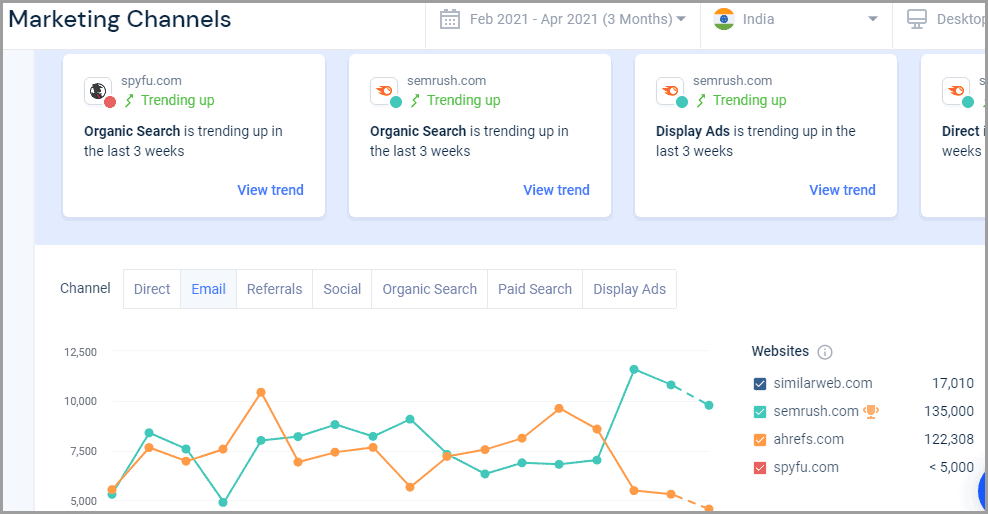
Similarweb refreshes its keyword data weekly. This does compensate for the lack of “instant, one-click” updates that Semrush offers for some of its metrics.
Similarweb offers “Amazon e-commerce” data, this includes no. of units sold, revenue etc.
And finally, it’s easier to find affiliates and ad-networks on Similarweb if you’re into media buying due to its “outgoing ads” feature.
If you feel there’s a deal-making reason that I skipped here, I’d love to get your feedback on the same and include it here.
Semrush vs. Similarweb final verdict- Which is better?
Semrush offers nearly 3x the features, at about 70% price. So yes, I’ll say Semrush is definitely the better, more reasonable choice for most of you here. Primarily if you’re into SEO, content marketing or social media management.
However, for a very specific group of people, especially those who’re into “posting ads on networks” Similarweb may be the better choice.
Put bluntly, almost everything that Similarweb can do, Semrush can, and then a lot more. Does this mean Similarweb isn’t worth your time? Absolutely not. I love Similarweb for the things it can do. It’s just that when “compared” specifically to Semrush, it falls short.
Hey, please don’t take my word for it! Go get the 14-day Semrush free trial and the 7-day free Similarweb trial and decide for yourself.
Start Semrush 14-days Free Trial Now
Frequently Asked Questions
We’re done with the comparison, but I’m sure you’ve got a few questions left for both the tools. Let’s get you some answers?
#1. Semrush vs. Similarweb: Which offers more features?
If I talk purely of “numbers”, Semrush offers about double or more the number of features than Similarweb.
#2. Which of these two offers a free trial?
Both the tools offer a free trial. Semrush offers a 14-day free trial, while Similarweb offers a 7-day free trial.
#3. Do I need credit card to avail Semrush or Similarweb free trial?
Yes. Both the tools require credit cards for you to avail the free trials. They both allow “anytime cancellation” policy and you aren’t charged if you cancel before your trial expires.
#4. Can I upgrade my plans with both the tools?
With Semrush, you can upgrade your plan instantly any time you want. With Similarweb, you’ll need to manually contact the team, state your requirements and then get the upgrade.
#5. Which of these offers better data accuracy?
While both the tools are pretty accurate, Semrush definitely offers a more accurate Keyword data (reason and source for this claim can be found above). Even in other areas, I’ve found Semrush offering more metrics, filters and information than Similarweb.
#6. Semrush vs. Similarweb which offers more value for money?
Semrush offers cheaper plans, with more features. That’s the simple, clear reason why I’d say Semrush offers more value for money.
